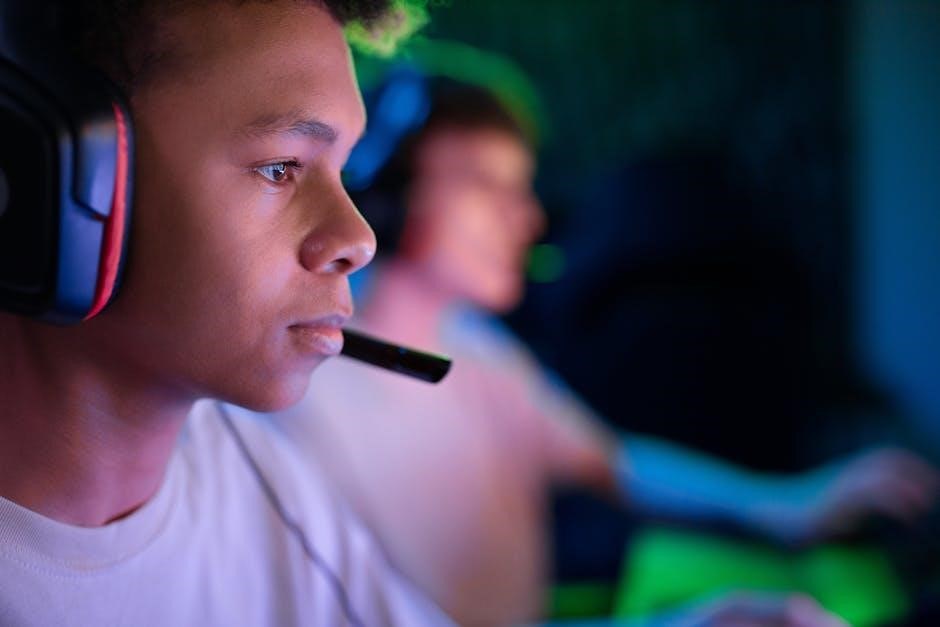
Sean Covey’s The 7 Habits of Highly Effective Teens provides a framework for personal growth and success. These habits empower teenagers to take control of their lives, fostering self-discipline, responsibility, and meaningful relationships. By adopting these principles, teens can navigate challenges effectively and build a strong foundation for their future.

Habit 1: Be Proactive
Being proactive is about taking responsibility for your actions and choices. It means you are in control of your life and are not influenced by external circumstances. Proactive individuals do not blame others or wait for opportunities to come to them; instead, they create their own path. For teenagers, this habit encourages self-discipline and accountability, helping you avoid reactive behaviors like procrastination or making excuses. By being proactive, you can anticipate challenges and prepare for them, fostering a mindset of initiative and personal growth. This habit is the foundation for developing the other six habits, as it empowers you to take charge of your decisions and outcomes. Proactive people focus on what they can influence rather than what they cannot, leading to greater confidence and resilience in navigating life’s challenges.

Habit 2: Begin with the End in Mind
Beginning with the end in mind is about setting clear, long-term goals and aligning your daily actions with those goals. This habit encourages teenagers to think deeply about their values and what they want to achieve in life. By creating a personal mission statement, you can clarify your priorities and make decisions that align with your aspirations. This habit helps you focus on what truly matters, rather than getting distracted by short-term impulses or pressures from others. It also fosters a sense of purpose and direction, enabling you to stay motivated and resilient in the face of challenges. By starting with the end in mind, you can avoid wasting time on unimportant tasks and instead invest your energy in activities that contribute to your personal growth and success. This habit is essential for building a strong foundation for your future and ensuring that your actions are intentional and meaningful.

Habit 3: Put First Things First
Putting first things first is about prioritizing and managing your time effectively to focus on what truly matters. This habit emphasizes the importance of self-discipline and avoiding procrastination. Sean Covey suggests using a time management matrix to categorize tasks into four quadrants: urgent and important, important but not urgent, urgent but not important, and neither urgent nor important. By focusing on tasks that are important but not necessarily urgent, you can achieve long-term success. This habit helps teenagers avoid wasting time on unproductive activities and instead invest their energy in meaningful goals. It also encourages setting boundaries and learning to say “no” to non-essential tasks. By prioritizing what truly matters, you can reduce stress, improve productivity, and create a sense of balance in your life. This habit is crucial for developing self-discipline and ensuring that your daily actions align with your long-term vision. It empowers you to take control of your time and make intentional decisions that lead to personal growth and success.
Habit 4: Think Win-Win
Habit 4, “Think Win-Win,” is about fostering mutual benefit in relationships and seeking solutions where everyone involved can succeed. Sean Covey emphasizes the importance of understanding and valuing others’ perspectives, which builds trust and strengthens connections. This habit encourages teenagers to move beyond a “me versus you” mindset and instead focus on collaboration and cooperation. By thinking win-win, teens can create meaningful relationships and achieve their goals while helping others do the same. This approach also involves being open-minded and willing to compromise, ensuring that both parties feel respected and heard. The win-win philosophy promotes a positive and supportive environment, whether in school, at home, or with friends. It teaches teenagers the value of empathy and the long-term benefits of building strong, healthy relationships. By adopting this habit, teens can become more effective communicators and problem solvers, leading to greater personal and interpersonal success.

Habit 5: Seek First to Understand, Then to Be Understood
Habit 5 focuses on the importance of empathy and effective communication. Sean Covey emphasizes that understanding others is a crucial step before seeking to be understood oneself. This habit teaches teenagers to listen actively and genuinely, rather than simply waiting for their turn to speak. By doing so, teens can build stronger relationships and resolve conflicts more effectively. The habit encourages open-mindedness, allowing teenagers to see things from another person’s perspective. This fosters a deeper understanding of others’ feelings, needs, and viewpoints. When teens prioritize understanding, they create an environment of trust and respect. This habit also helps teenagers become better communicators, as they learn to express their own thoughts and feelings more clearly after genuinely listening to others. By mastering this habit, teens can navigate social situations with greater ease and sensitivity, leading to stronger, more meaningful connections with others. It is a powerful tool for developing emotional intelligence and fostering harmony in relationships.

Habit 6: Synergize
Habit 6, Synergize, is about working together to achieve something greater than what could be accomplished alone. Sean Covey explains that synergy is the idea that the whole is greater than the sum of its parts. This habit encourages teenagers to value diversity, collaborate effectively, and combine their strengths with those of others. By doing so, teens can create innovative solutions and achieve better results than they would individually. Synergize teaches the importance of teamwork, open communication, and mutual respect. It emphasizes that everyone has unique perspectives and skills to contribute. When teenagers embrace this habit, they learn to thrive in group settings, whether in school, sports, or personal projects. Synergizing also fosters creativity and problem-solving, as different ideas and approaches are shared and built upon. By working together and valuing collaboration, teens can overcome challenges more effectively and build stronger relationships. This habit is a powerful reminder that success often comes from teamwork and the willingness to work together toward a common goal.
Habit 7: Sharpen the Saw
Habit 7, Sharpen the Saw, focuses on self-care and personal renewal. Sean Covey emphasizes the importance of taking care of one’s physical, social/emotional, mental, and spiritual well-being. This habit encourages teenagers to recharge and maintain balance in their lives to avoid burnout and ensure long-term effectiveness. By prioritizing self-care, teens can improve their energy levels, resilience, and overall quality of life. Activities such as exercise, healthy eating, adequate sleep, and spending time in nature are examples of sharpening the saw physically. Mentally, it involves engaging in activities that stimulate the mind, like reading or learning new skills. Spiritually, it might involve reflection, meditation, or connecting with personal values. Socially, nurturing relationships and building strong connections with others also fall under this habit. By regularly “sharpening the saw,” teenagers can sustain their efforts in practicing the other six habits and achieve greater success and fulfillment in all areas of life. This habit reminds teens that taking care of themselves is essential to being effective in everything they do.

The Impact of These Habits on Teenagers
The 7 habits help teenagers build self-esteem, improve relationships, and develop essential life skills. They foster resilience, responsibility, and confidence, enabling teens to navigate challenges effectively and create a balanced, fulfilling life.
Benefits of Developing These Habits
Developing the 7 habits offers numerous benefits for teenagers, including enhanced self-esteem and improved decision-making skills. These habits foster resilience, responsibility, and confidence, enabling teens to navigate life’s challenges effectively. By being proactive, setting goals, and prioritizing tasks, teenagers can achieve academic success and build stronger relationships. The habits also encourage empathy and understanding, promoting harmonious interactions with others. Over time, these practices cultivate a balanced lifestyle, leading to personal growth and a positive outlook on life. Ultimately, embracing these habits equips teenagers with the tools needed to thrive in all areas of their lives.
How to Implement These Habits in Daily Life
Implementing the 7 habits requires consistent effort and mindfulness. Start by identifying areas in your life where improvement is needed. For Habit 1: Be Proactive, take personal responsibility for your actions and choices. Practice self-reflection to understand your influence over your outcomes.
For Habit 2: Begin with the End in Mind, set clear, long-term goals and create a personal mission statement to guide your decisions. Use a journal or vision board to stay focused on your objectives.
Prioritize tasks using Habit 3: Put First Things First by categorizing activities into urgent, important, or trivial. Use tools like planners or apps to manage your time effectively.
Adopt a win-win mindset by seeking mutually beneficial solutions in relationships and decisions. Practice active listening and empathy to foster deeper connections.
Finally, sharpen the saw by dedicating time to self-care, including physical exercise, mental relaxation, and spiritual renewal. By integrating these habits into your daily routine, you’ll build a strong foundation for personal growth and success.